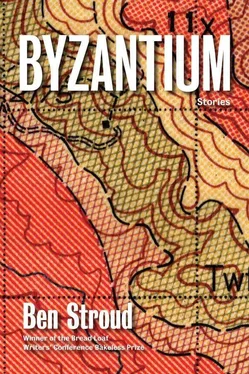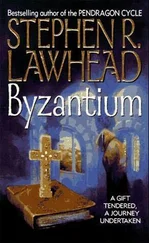Ben Stroud
Byzantium: Stories
RUMOR HAS IT THAT SHORT STORY WRITERS, nowadays, are meant to lack ambition. That short stories are best when about wee tiny things. That brief fiction should be about precious moments, only, and not about the great and grand events. That the short story’s province is one of glowing epiphanies and small changes at the last minute. Short stories should not aspire to gulp down the steaming bouillabaisse of the big world; short stories should remain happy with nibbling at cute cucumber sandwiches. Who honestly believes these hollow prejudices, I do not know.
Clearly, Ben Stroud did not get this misleading e-mail, and I am so very grateful for that oversight, and I do believe the world of prose fiction is all the richer for it.
Rather than spend time trying to diagnose how the world’s vision of the short story became so anemic, let us instead praise the full-blooded sweep and majesty of Stroud’s imagination. Let us celebrate a writer of great bravery and artistry and deep feeling. To be sure he takes us far and wide — from Bismarck’s Prussia to the conquistadors’ New Spain to the Bosporus’s still-Constantinople. Ben Stroud has wanderlust; this collection, Byzantium, is our ticket to ride.
The earliest known record we have of the black detective Jackson Hieronymus Burke — the Moor — is an advertisement he ran in several Berlin newspapers in 1873, promising discretion and modest fees. (“The Moor”)
For some odd reason the concept of historical fiction has been greatly maligned among certain learned folk. To them the very phrase conjures up the lurid covers of bodice rippers set on antebellum plantations, or yet another mediocre novel about Gettysburg or the sack of Rome, or a poorly imagined biography of Caravaggio doctored up to look like fiction. It is convenient for them to forget that War and Peace is a historical novel, or to make bizarre rationalizations about the astonishing recent work of Hilary Mantel.
Herein rests Stroud’s great courage. A story about a black sleuth in mid-nineteenth-century Berlin, “The Moor,” could have been a recipe for disaster, but thanks to Stroud’s Calvino-like deconstruction of narrative, a literary whirligig about mystery — masterfully done — turns the unlikely ingredients into a marvel of storytelling, unafraid of exposition, of history, of being out of fashion. It is a story that reads as if it could have been written way back then and in another language, and yet it resonates so very slyly with Obama-era preoccupations about race and origins and government and terrorism and how we try to make sense of our world.
Stroud is preternaturally wise about what it might be like to be a European man loose in the curious colonial, slave-fueled, mosquito-ridden Caribbean and the invention of a “cooling safe.” The voice in “Borden’s Meat Biscuit” is not show-off or drenched in dutifully researched facts, but remains convincing, a successful act of linguistic legerdemain:
Here we paused as several negroes dressed in finery paraded before us, their masters goading them, showing them off to the city’s wealthy gathered on the courthouse lawn. Timson leaned closer and whispered. “I have been in contact with agents of President Pierce. They have given me assurances.”
The sentences, so often deceptively simple, tell so much with an admirable economy. Most often these stories begin in medias res. There is an implicit trust in the reader’s intelligence, which makes the reading of these stories all the more engaging: it is not as much a matter of figuring things out as it is an interiority — you are experiencing this world from the inside out. Stroud respects us, expects us to be as involved, curious, and transported to these worlds as he is. We are to be flies on the wall with him.
The stories that take place in our current time have a similar fascination with travel, the wide world, the history of cities, personal histories, the mystery of history, and the history of mystery. “Amy,” a story about an American in Europe and his unfaithful heart, moves us because our young man is trying to figure out his own treachery, and failing. (“I am blameless. I said: I owe no one. I said: Surely something better has been promised me.”) Sad, self-deluded fellow. Just as in the story “Eraser,” the protagonist grapples not just with the people around, but with what Faulkner once called “the human heart in conflict with itself.”
Of course that understanding is the price of the ticket, the thing that makes Ben Stroud’s stories a cut above. So we sail with him to Byzantium, to the distant shores of newly discovered countries; we witness warriors and slaves and soldiers and ship captains, but we are always reminded, taken back to the wonderful, maddening mysteries inside us all.
Yes, Ben Stroud is brave, Ben Stroud is smart, Ben Stroud is funny, Ben Stroud is a magician, Ben Stroud teaches us what it is like — past and present — to be human.
I dote on these stories, and hope you will enjoy them as much as I do.
— Randall Kenan
IWAS BORN a disappointment.
My father was John Lekapenos, one of the emperor Maurice’s favorite generals. He had risen through the ranks from a hovel in Thessaly and had plans to establish himself — through me — among the great families. In the years he awaited my arrival, he elaborated my future career: the army, an illustrious marriage, a governorship or high ministerial position. But when I was brought to him, still smeared with my mother’s blood, the first thing he saw curling toward him out of the blankets that swaddled me was the chewed red crook of my withered hand.
He must have thought it a talisman of his reverse. Not long after my birth, Maurice was overthrown and my father discharged from the army by the usurper, Phocas. He was forced to leave the camps for good, and, bloated and disheveled, he spent his days sitting in the kitchen with a pot of wine, haranguing the servants about long-ago campaigns against the Avars and the Bulgars. He talked of armies massed in the cold along the Danube, of the legion’s priest bringing forth the icon of the Holy Mother, and how he would know, if the sun glinted just right against her eyes, that it would be a good day for fighting. The servants ignored him, but I always listened, snug in my hiding spot behind the oil vat, my legs folded against my chest. He loathed the sight of me, would cuff me whenever I came into his presence, but I liked to be near him, and longed to prove myself worthy of his love.
I never had the chance. He died when I was eight. He was in his bedchamber, putting on his old uniform. The Persians had been swallowing provinces whole, Phocas had in turn been deposed, and my father hoped the new emperor, Heraclius, would give him a legion. They had campaigned together years before, and he’d talked of nothing else for weeks, brightening when at last he heard the drums of Heraclius’s soldiers as they entered the city. As soon as Heraclius was established in the palace and Phocas’s ashes were tossed in the sea, my father prepared for court. He was to go that morning and was cleaning his sword — this he always insisted on doing himself — when he put his hand over his arm. Then he collapsed. I had hidden myself in a corner behind a chair, and when he fell I stayed there watching for nearly an hour. Eventually I crept away and left him for the servants to find.
That was the end of any hope for us. My mother kept me shut in the city house, where she looked after our dwindling fortune. I spent my days reading or hiding in the garden, listening to the servants’ gossip.
Читать дальше











